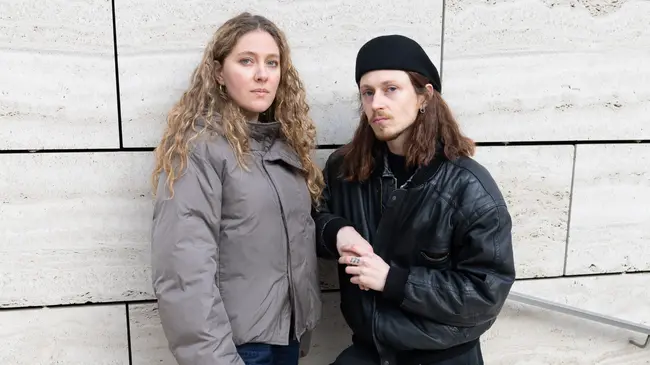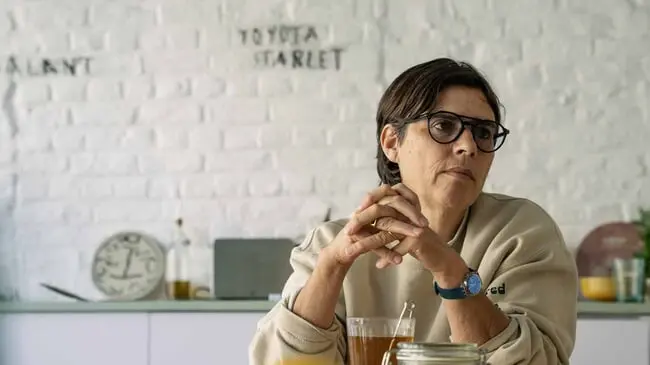You want to do something, you want to scream. But no one is listening

While exploring Rinus Van de Velde’s dreamlike exhibition Inner Travels, conducted by EUROPALIA, we met Denys Shantar, a Ukrainian artist who grew up in Switzerland but is currently based in Antwerp. In between a makeshift life-sized cardboard train, gripping charcoal and oil paintings, disorienting films and a captivating humanoid plastic mask, we talked home, roots, daydreams and politics.
The interview was first conducted on Friday 18 Feb. Russian military forces invaded Ukraine on 24 Feb. Denys Shantar asked us to provide an update to his questions, in light of the events.
What did you think of the exhibition?
I really enjoyed it. During the whole exhibition, you are immersed in Rinus Van de Velde’s world, which is something quite different. It is a nice escape, a sort of fictionalised autobiography. I think my work is not so daydreamy. I wish I could lie or make stuff up. I always say I'm not that creative because my work is just me. But I believe that there is still always a fictional part because it's based on how I perceive and remember things. In the end, it is only my truth.
Can you tell me more about a recent work of yours?
Flags (And Other Short Stories) started during the second lockdown when I moved to Belgium for my Master in costume design. I was embroidering and making collages on fabric at home. There was just so much happening inside myself, but also in the world. Like the war and conflict in Eastern Europe. Or last year, a gay man was murdered in Belgium. The stuff that comes from outside when you're stuck at home. You want to do something, you want to scream. But no one is listening. These flags are silent screams. I call them flags, but they're more like protest banners. They are big, they are loud. But you have to read them. And you can also fold them in a box and put them away.
I could have never imagined how accurate these words would become. It’s interesting how there was an interest in the flags, before the war. The works have never been as important as they are right now. The flags speak louder. I believe that people finally understand the message I was trying to send.
What is home to you?
Recently, this question has come up a lot. I think people, with the pandemic, found a way back to their roots and made art about it. But I can't really remember what I answered [laughs]. I grew up in Switzerland. But I don't feel either Swiss or Ukrainian. I'm in Belgium now, and I'm obviously not Belgian. At the moment, Antwerp is home. It's a place I feel comfortable in. But for Western people, I'm an immigrant. For people in Eastern Europe, I'm this Western-Swiss boy. I know my privilege of growing up in Switzerland. I want to use this privilege to educate people and talk about what’s going on in Eastern Europe. Through telling my family story, my immigration, my mother's to the West, I can make the story global.
I grew up in a world where everyone wanted to put me in a box. I believed that my only escape was to become this person from a non-space. Not being patriotic, but pragmatic. Exploring my background, my different cultures. During my Masters, I focused on two simple questions: 'Who am I?' and 'Where do I come from?' I didn't believe that I would find an answer to these questions. The questions may be answered themselves, I thought. But the minute I found out that Russia invaded Ukraine, I knew the answer. I was, I am and always will be Ukrainian. It took a war to answer these simple two questions.
Do you have a preferred medium?
At the moment, I enjoy working with fabric. More and more, I am becoming interested in language. Because I speak six languages, my brain is sometimes confusing. I'm dyslexic in all six so it’s as if I have my own language. When I write, I forget how to say things in the language I’m writing in. I write it down somehow, phonetically, in any language I can find. I want to incorporate this into my work. Maybe it will say something about my identity. Then, of course, I love painting and drawing. I like photography and video. I don’t prefer anything in particular. It’s more about storytelling and what comes in handy. To tell a certain story, you need a specific medium. What I’d like to do is connect all these different mediums to make installations. That’s why I connected with Rinus’ work. I like when you have drawings, texts, sculptures, scenography, all layered.
This question of language is crucial. I’m a Ukrainian that speaks Russian. Should I be mad at the language my mother gave me? The language she was given by the Soviet state? The language, the people who bomb my country speak? No, I’m not mad at the Russian language. It is still my language, the language of my mother. But I love the Ukrainian language, and I wish I was more fluent. Ukraine has been independent since 1991. Ukrainian is its official language, and that must be respected. That’s why it’s imperative today to use the correct Ukrainian version of the cities. You can’t denounce Russian occupation while occupying with language. It is Kyiv not Kiev, Kharkiv and not Kharkov, and it’s Ukraine and not the Ukraine.
Is there a specific work that stuck with you?
I think it's one of the last works, a painting that said something like 'Some art historians and lousy curators kept searching in the totally wrong direction'. I like when the works are funny, while actually having something to say. I can relate to this statement. A lot of the time, I am frustrated with the art world. I think a lot of young artists take themselves way too seriously. I want to tell them 'we're not saving the world, calm down'. Maybe I'm the stupid curator and historian looking in the wrong direction. Maybe I don't get something. But I'm always open to learning. Rinus Van de Velde I can connect with. There is humour in his work, and something charming and relatable. It just works. But I usually connect more with old masters. Or artists from Eastern Europe, because they feel closer. For me, it's very interesting how other young artists from former Soviet countries, who were also born in the nineties, express their feelings, fears, emotions into work.
I’m still frustrated with the art world. They expect something from you now. And you expect even more from yourself. You have to act, because the world is willing to listen, to read your banners, finally. It is nice to finally be heard, after years of talking about Eastern Europe. We may not save the world, but we can definitely change something. Anna Potsiluyko and I are currently organising an exhibition in Antwerp to raise money for marginalised people who want to flee Ukraine. It will be at Het Bos, from 18 till 20 March. Follow @motherland.mvmt for more information on the event.
You have to act now, because the world is willing to listen, to read your banners, finally
Different Class works with the interest of their community at heart.
Our work’s purpose is to foster a solid network for independent artists, those who love them, and those who want to support them. Become a member to contribute to the local Belgian art scene.






